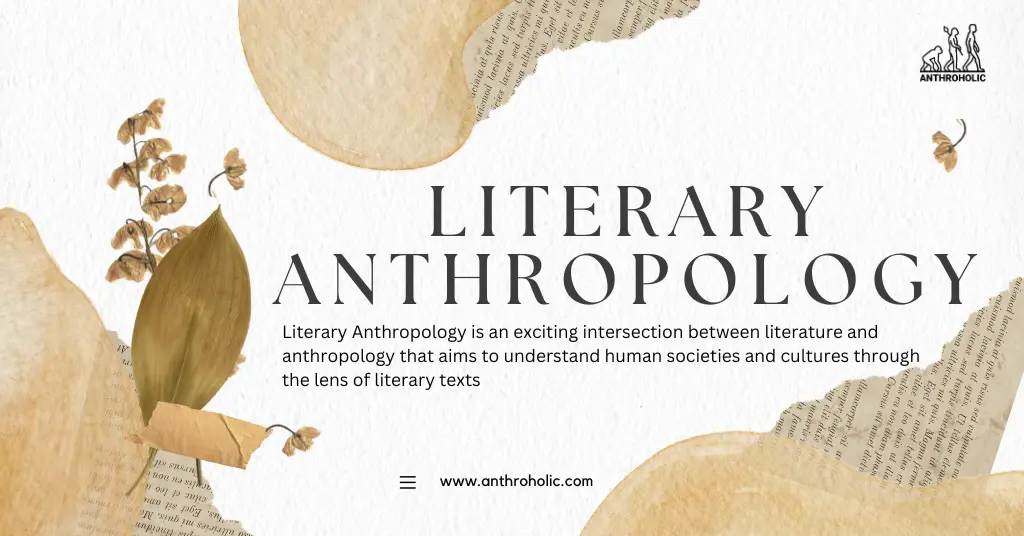AI Answer Evaluation Platform Live Now. Try Free Answer Evaluation Now
Literary Anthropology
Literary Anthropology is an exciting intersection between literature and anthropology that aims to understand human societies and cultures through the lens of literary texts [1]. Drawing from anthropology’s investigative methodology, this field excavates beneath the text’s surface to reveal cultural, social, and human insights embedded within literature.

What is Literary Anthropology?
Broadly speaking, Literary Anthropology applies anthropological theories, methods, and insights to analyze literature. The central idea is to understand a culture or society through its narratives, myths, and stories, thereby revealing the underlying values, beliefs, and social structures [2].
Methodology in Literary Anthropology
The methodology used in Literary Anthropology can be understood in two primary steps:
- Ethnographic Reading: This involves understanding the literary text as a form of cultural expression. It requires identifying cultural symbols, references, and conventions within the text.
- Cultural Analysis: Following ethnographic reading, the text is analyzed in the context of the culture or society it represents. This involves understanding the social, historical, and political contexts in which the text was created and how it reflects or challenges these aspects [3].
The Significance of Literary Anthropology
Literary Anthropology is significant for several reasons:
- Revealing Cultural Values and Beliefs: The study of literature through an anthropological lens helps unveil the values, beliefs, and attitudes of a society or culture at a specific time in history.
- Understanding Social Structures: By analyzing the interpersonal relations and power dynamics within literary texts, we can gain a deeper understanding of the social hierarchies and structures in a particular culture.
- Contextualizing Historical Events: Literature often reflects significant historical events. Through literary anthropology, these events can be understood in a more nuanced, human context [4].
- Diversifying Anthropological Sources: Literary texts provide an alternative source of ethnographic data, complementing traditional sources such as fieldwork and participant observation.
| Benefits | Description |
|---|---|
| Reveals cultural values | Unveils deep-rooted values, beliefs, and attitudes |
| Understands social structures | Offers insight into social hierarchies and dynamics |
| Contextualizes history | Provides a human, nuanced view of significant events |
| Diversifies sources | Supplements traditional anthropological data sources |
Examples of Literary Anthropology
One of the best-known examples of Literary Anthropology is the study of Homer’s epic, ‘The Odyssey’. Anthropologists like Lord Raglan and Otto Rank analyzed the text to reveal universal hero patterns and shared mythological structures across cultures.
Another example is the study of African oral literature to understand pre-colonial social structures and cultural practices. Anthropologists have used these narratives to reconstruct African histories that had not been previously documented.
Literary Anthropology in Practice
While Literary Anthropology may be a niche field, its practice and influence can be seen in a variety of academic and cultural contexts. Some specific practices include:
- Cross-Cultural Studies: Comparative literature often employs literary anthropology to discern cultural patterns and universal narratives across various societies.
- Historical Studies: Literary texts from a particular historical era can provide a more nuanced understanding of social hierarchies, cultural values, and political contexts of that period.
- Indigenous Studies: Indigenous narratives and oral traditions are rich sources of anthropological data, often revealing a society’s unique relationship with its environment, spiritual beliefs, and social norms.
- Gender Studies: Literary anthropology helps understand the construction and evolution of gender roles within different cultures, as depicted in their literature.
Future Directions for Literary Anthropology
The field of Literary Anthropology continues to grow and evolve. Some potential future directions include:
- Digital Literature: With the rise of digital media, there is a vast array of new material for literary anthropologists to explore. Internet-based narratives, social media, and digital storytelling platforms all offer new opportunities to study contemporary culture.
- Globalization and Transnationalism: As cultures increasingly intersect and influence one another, studying transnational literature can reveal interesting insights into global cultural dynamics.
- Deeper Interdisciplinary Collaborations: Combining literary anthropology with other disciplines like sociology, linguistics, and psychology can produce comprehensive cultural analyses.
| Future Directions | Description |
|---|---|
| Digital Literature | Study of internet narratives and digital storytelling |
| Globalization and Transnationalism | Examination of literature across intersecting cultures |
| Interdisciplinary Collaborations | Fusion of literary anthropology with other disciplines |
Conclusion
Literary Anthropology, with its ability to explore human societies through the prism of literature, is a remarkable tool for researchers. While it has its limitations, the field also offers a unique approach that complements traditional anthropological methods. As we continue to advance in the digital age, the potential for literary anthropology only broadens, enabling researchers to explore contemporary cultural phenomena in new and exciting ways.
References
[1] Clifford, James, and George E. Marcus, eds. Writing culture: The poetics and politics of ethnography. University of California Press, 1986.
[2] Geertz, Clifford. Works and lives: The anthropologist as author. Stanford University Press, 1988.
[3] Pratt, Mary Louise. Imperial eyes: Travel writing and transculturation. Routledge, 2008.
[4] Miner, Horace. “Body Ritual among the Nacirema.” American Anthropologist 58, no. 3 (1956): 503-507.




